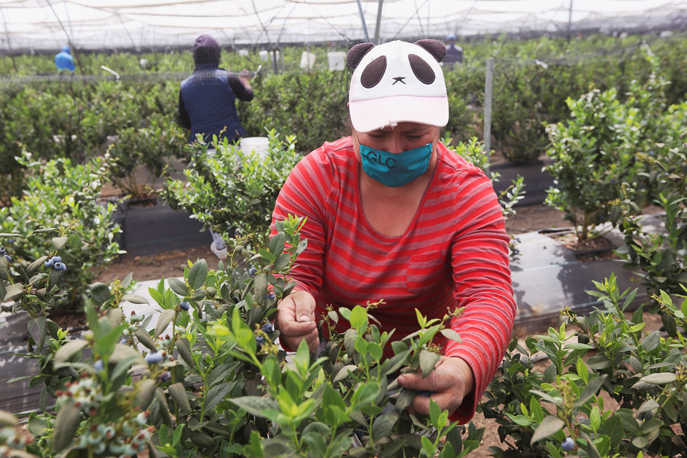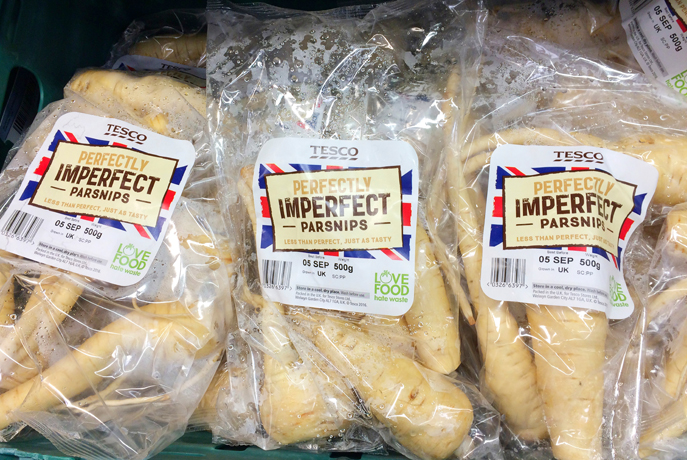COMMENT: Ignacio Gavilan of The Consumer Goods Forum says Covid-19-related shortages mean shoppers are more accepting of wonky veg schemes introduced by UK retailers like Tesco
Food waste is an enormous environmental, social, and economic problem that impacts every single aspect of the supply chain. According to the UN, around 14% of food produced by the fresh produce industry is lost somewhere between the stages of harvest and retail, most of which is wasted at retail and consumption levels.
The business case for action on food waste is compelling and in three parts: a financial return to member companies (on average €14 for every €1 invested); a reduction in greenhouse gas emissions (food waste accounts for 8% of all GHG); and an improvement in food security and redistribution (we waste one third of the world’s food supply while one in nine people worldwide goes hungry each day).
In June this year, The Consumer Goods Forum (CGF) launched its Coalition of Action on Food Waste. The coalition launched on the back of five years’ work with key CGF members who’ve continually demonstrated their commitment to halve food waste, from harvest to plate, in line with the UN’s Sustainable Development Goals.
Businesses are often guilty of sweeping the issue of shrinkage under the rug, writing off profit loss as 'perishables'
In fact, our members have achieved some standout results, with Campbell’s able to recycle 84% of waste produced. Carrefour also found that 66.6% (more than 412 600 tonnes) of waste produced in its stores was recovered in 2015.
One of biggest issues the coalition identified was the large amount of food waste inadvertently occurring through inefficient business practices within the supply chain, also known as shrinkage. Many businesses have learned to live with shrinkage across the supply chain, but not addressing it represents a missed opportunity and, therefore, should never be acceptable.
In practice, some shrinkage will always occur, but businesses should do everything within their power to reduce it, without harming margins. Profit is important, but we need to go beyond. Businesses are often guilty of sweeping this issue under the rug, writing off profit loss as “perishables”, rather than looking into the problem or, indeed, addressing it.

And, what about producers? This year, as a result of the Covid-19 pandemic, a huge number of crops were lost when lockdowns hit in April and May. There simply weren’t enough workers available to pick them.
Consider also that, in an industry reliant on immigrant workers, physical restrictions imposed during the pandemic have disrupted – and will continue to disrupt – the availability of certain fruits and vegetables, given that the workers who usually do the labour-intensive planting of crops are unable to get to the right locations to do the job. Furthermore, while many businesses successfully adapted their supply chains to keep business moving in the middle of the pandemic, restrictions on movement meant an increase in transportation costs for raw products, as well as an increase in carbon footprint.
All of this means the ravages of the coronavirus crisis will be apparent in the perishable fruit, vegetable, meat and dairy product aisles, where shoppers are likely to see fewer choices during lockdown.
China’s renewed focus on food waste demonstrates that once a government commits to tackling the issue, it makes a huge difference
One way food waste can be mitigated is to encourage greater acceptance of food of all shapes and sizes. A lot can be said for food standards globally, but one thing that must change is the preference for perfection when it comes to the aesthetics of products, particularly fresh fruit and vegetables.
The retail sector is pivoting to address this, with the UK among those leading the charge. Retailers such as Tesco have started selling “wonky” or “imperfect” fruit and veg at a slightly lower cost, while many major British supermarkets are forging relationships with manufacturers based on long-term incentives and trust. There’s also greater commitment to improving practices in-store, such as better rotation of product, date labelling, and discounts when a product is about to expire.
We’ve also seen encouraging trends around tackling food waste across regions that, to date, have had inconsistent track records, with China taking centre stage. After the launch of its Clean Plate Scheme last month, the Chinese government announced it was taking measures to reduce food waste among its 1.4 billion citizens. It will be interesting to see how this plays out, not only when it comes to the wider supply chain, but also the potential impact from such a huge consumer base. In fact, China’s renewed focus on food waste demonstrates that once a government commits to tackling the issue, it makes a huge difference.

While these initiatives from retailers and governments alike are already promising, perhaps the most inspirational aspect is seeing how consumers are also stepping up to the plate. The pandemic has increased consumer awareness around food waste, with the hundreds of millions of people now working from home suddenly realising just how quickly their kitchen bins and recycling containers fill up. The pandemic caused more attention to be paid to sell-by dates, as every little bit of food counts more when the number of shopping trips and time outside the house is limited. Meanwhile, with less produce available, initiatives like the “wonky” fruit and veg schemes became more commonly accepted.
Consumer behaviour was well and truly shaken up by the pandemic and, as repeat lockdowns come into force worldwide, these initial changes are transforming into long-term habits. We believe we’ll see awareness trends on food waste continue to increase over the next few years.
So, what lies ahead in the battle against food waste? Well, as a coalition we have two key challenges. The first is to be the leading voice in raising awareness of the issue. Our members will be using their voices and influence on the global stage to help drive positive change. Second, we must represent the benchmark for positive global action, using the knowledge we gained from addressing Covid to inform the relentless pursuit of our commitment to halve food loss across our supply chains and production lines by 2030.

Ignacio Gavilan is director of environmental sustainability at The Consumer Goods Forum.
Coronavirus Covid-19 pandemic CGF Coalition of Action on Food Waste SDGs tesco campbell's Carrefour

